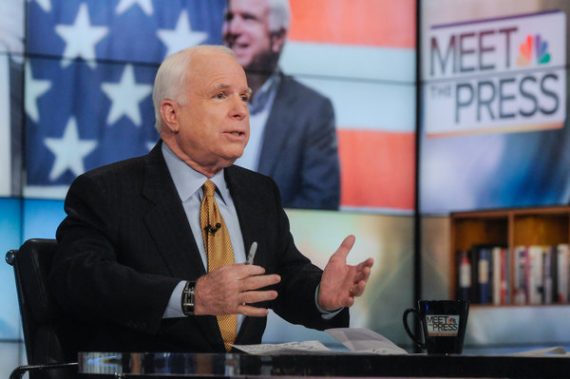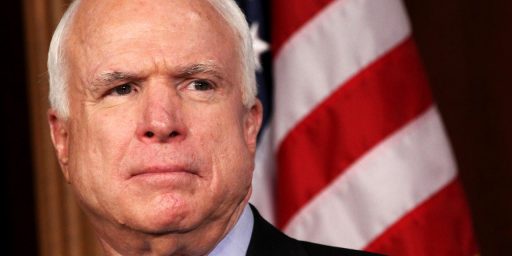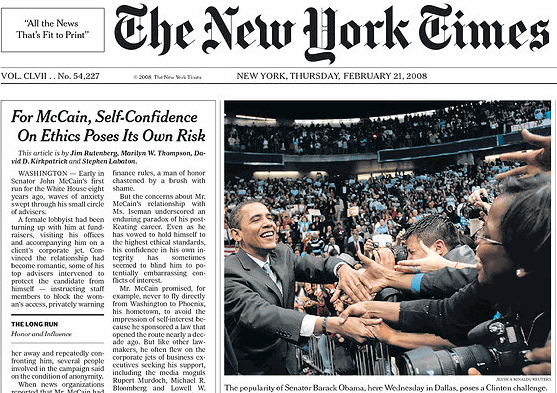Sunday Morning Shows: Beltway Conventional Wisdom Getting Attention They Don’t Deserve
Sometimes it seems like all John McCain does is appear on Sunday morning news shows. The problem goes deeper than that, though.
Today’s Sunday morning shows will, understandably be devoted to last week’s revelations regarding the National Security Agency’s various surveillance programs. Among the guests will be the Chairs of the House and Senate Intelligence Committees, a former director of the NSA itself and, in what has become a seemingly endless tradition, Arizona Senator John McCain. Indeed McCain seems to stand as Exhibit A for the argument that these shows seem to recycle the same guests over and over again:
WASHINGTON — In mid-February, Senator John McCain went on the NBC program “Meet the Press” to explain his unhappiness with President Obama’s nominee for defense secretary. A week later, he took to “State of the Union” on CNN to chat about sequestration (bad) and the attack in Benghazi (worse).
In May, he was on “Fox News Sunday,” talking about Middle East politics with Chris Wallace. Last week, Mr. McCain, who was in California for his oldest son’s wedding, hit “Face the Nation” on CBS, via satellite, to discuss his trip to Syria.
Mr. McCain, Republican of Arizona, is not his party’s most recent presidential nominee. He is no longer the highest-ranking Republican on any major Congressional committee. And as party spokesmen go, these days he is just as often speaking against Congressional Republicans as with them.
Yet on many given Sundays — over 60 of them since 2010 — Mr. McCain repairs to a television studio in Washington to hold forth. On “Face the Nation” alone, Mr. McCain has appeared more than any other politician in the program’s 60-year history.
His Sunday ubiquity has set off some grumbling in Washington that producers give him too much airtime. It also tends to solidify the impression in living rooms across America that he remains the spokesman for, and titular head of, his party.
“Really?” Mr. McCain said with a soupçon of glee when informed of his record-breaking Sunday showiness. “Well I enjoy them. I find it is the best way to communicate with the American people.”
In many ways, the Sunday morning talk shows are like ID lanyards and BlackBerries. While much of the nation has lost interest in them, they hold a big — some would say disproportionate — sway in Washington.
The programs’ producers and members of Congress — and, to some degree, White House officials — collaborate in a weekly seduction ritual in which producers try mightily to get the most powerful guests and newsmakers of the moment, as the guests’ staffs weigh the risks of stepping before some of the toughest questioners in Washington.
When it comes to a dream guest, program hosts say, Mr. McCain checks almost every box: a senior Republican senator who can speak authoritatively and contemporaneously on many issues, flies secretly to Syria, compares members of his own party to deranged fowl and yet is a reliable opponent of most Obama administration policies.
“What makes a good guest is someone who makes news,” said Mr. Wallace, the Fox host. “To make news, you have to be at the center of the news and willing to talk about it in a noncanned way, someone who always come to the shows ready to play.”
He went on: “I sometimes think to myself, ‘Gee we’ve had McCain on a lot,’ ” not to mention Senators Lindsey Graham, Republican of South Carolina, and Richard J. Durbin, Democrat of Illinois. “But the fact of the matter is they are good guests.”
And good guests become frequent guests. The programs tend to be dominated by a handful of predictably quotable politicians. Others make only rare appearances when a pet issue rears its head. And still others, by choice or by elimination, never make the cut at all.
The constantly repeating guests is one of the reasons that these shows have become mostly unwatchable. Week after week, you get the same conventional wisdom from virtually the same people while other voices and other points of view tend to get crowded out. In some sense, it may be because all of these shows are recorded in Washington. While you’ll occasionally see This Week, Meet The Press, or the others, have a guest appearing via video link from a remote location, it’s rather obvious that the shows prefer to have their guests in studio. That means that Congressman and Senators who don’t spend their weekends in Washington rarely get on these shows, while pundits and political analysts who don’t live in the area rarely get invited to be part of the “round table” segment that seems to have become a ubiquitous part of all these shows. That, quite likely, is the main reason why these shows are accused, largely correctly, of having an inside the beltway, conventional wisdom, bias to them.
Another issue with these shows, though, is that they are given far more importance in the news cycle than the probably deserve:
Critics of the Sunday programs argue that the words spoken on them are at once too calculated and overly interpreted, simply by virtue of where they are delivered. “You can go on Charlie Rose midweek and have a long conversation that ends in a game of strip poker and no one will pay attention,” said Philippe Reines, a senior adviser to former Secretary of State Hillary Rodham Clinton. “You go on a Sunday show, and everyone is looking for the slightest change, a new syllable, some new nuance.”
The prominence of guests with strong points of view can give viewers a false sense of proportion to certain sides of policy debates. This is most clearly the case with Mr. McCain, whose advocacy for military intervention in Syria and criticism of the administration’s policies there might create a sense that there is a robust policy debate over the matter in Washington when there really is not.
“In order to deal with complexity but also create a basis for entertainment,” said Aaron David Miller, a vice president at the Woodrow Wilson Center, “you need someone who knows what they are talking about who is pursuing daylight between themselves and the administration.”
Many guests believe that the talk shows also contribute to the partisan disharmony in Washington, though that may be like blaming a speck of pepper for the flavor of a 10-gallon pot of soup. Even the highest-rated programs attract fewer than 2.5 million viewers, a tiny audience by the standards of network television.
“There is a tendency on the Sunday shows to look more toward partisan polarization,” said David Gergen, a senior analyst for CNN who has advised four presidents. “They seek out people who are further out on the spectrum,” Mr. Gergen said, adding that “more than one senator” has told him the story of being bumped for a more partisan guest when they expressed moderate positions on issues in pre-interviews, something producers and hosts say is untrue.
“We aren’t looking for someone because of their ideological view,” said Bob Schieffer, the chief Washington correspondent for CBS and the moderator of “Face the Nation.” “We are trying to move the story forward.”
Schieffer’s protestations notwithstanding, it seems fairly clear that there is a strong desire on the part of all of these shows to do far more than just “more the story forward.” Instead, what is said on these shows ends up becoming the story far more often than it probably should. The best known recent example of this, of course, are the appearances by UN Ambassador Susan Rice on all five news network morning shows, referred to among Washington pundits as “the full Ginsburg,” in the wake of the attack on the U.S. diplomatic outpost in Benghazi.What she said on those five shows ended up becoming the subject of controversy and Congressional hearings for months thereafter, even though it now quite clearly appears it was based not an any effort on a cover up, but on a turf war between the CIA and the State Department about how the attack would be initially described based on the available intelligence. No doubt, someone will say something today on one of these shows that will also make for headlines for the rest of today and into tomorrow. Had they said it during a 2pm news block on CNN on Tuesday, it would hardly get noticed. Because they’re saying it on Sunday morning, though, it’s going to get a lot of attention, probably more than it deserves.
Finally, perhaps the most important thing to remember about these Sunday shows is that they largely consist of the political class, mostly inside Washington, talking to itself. That’s why, if you do watch them, you end up seeing a lot of commercials for defense contractors and large corporations rather than commercials from the kind off advertisers buying up time during the rerun’s of Law & Order that run on TNT during the same time block. For the most part, none of these shows have what could be described as spectacular ratings but they are regular viewing for the powers-that-be, the lobbyists, and the people who help set policy and drive the narrative that will shape news in the coming week. That’s why they have become so important, and why they’re likely to stay that way for the foreseeable future. Whether that should be the case, of course, is an entirely different question.






Good grief! Has Cindy McCain thrown him out? He spends every waking minute on Sunday talks shows and any other talk shows that will have him. Still, I guess he wants to stay relevant as he will never have the chance to run for President again. Or will he? Oh my God say it isn’t so?
I can’t wait for John Stewart to get invited so he can give them the full Crossfire treatment.
Stewart has been on one or more of the shows over the years as I recall
The best response to these shows is to read Charles Pierce’s “What the Gobshites Are Saying These Days” on Monday morning.
@Mr. Prosser: That, and later today Digby links to the most excellent Sunday show Bobblespeak translations
@rudderpedals: I may have to bookmark it.
Perhaps since the 2008 election Sen. McCain feels he has the least to lose by overexposure and candidly expressing his views/opinions. I’d love for them to put Ted Cruz there week after week to speak his mind openly, but that would harm the Republican party’s prospects moving forward, where McCain seems to be making not-so-subtle attempts to moderate the party before his time is through (moderate being a generous description).
The list of things I’d choose to do before subjecting myself to watching the Sunday morning talk shows never ends. Even Jon Stewart couldn’t get me there.
1-) Most of the time Lindsey Graham appears via videolink in these shows. The same for Durbin.
2-) I like the concept of the Sunday Talk Show: a politician answering tough questions and then policy wonks debating the news of the week. Unfortunately, politicians do not like answering tough questions(Considering that many politicians refuse to appear on these shows they do not like to answer even David Gregory level questions), and there are very few policy wonks debating the news.
The quality of the roundtable is a bigger problem than the McCainism. One can argue that Sunday Talk Shows can´t subpoena politicians to go to these shows and face tough questioning, but there is no excuse to see Harold Ford Jr. or these political consultants week after week.
3-) I saw John Kerry on BBC´s HARDTalk, answering questions from students in Ethiopia. Boy, he had to answer REALLY tough questions about Africa and Drones. Riz Khan had a show on Al Jazeera where people could phone or email questions, boy, Madeleine Albright spent really tough time on the show, it was possible to see that in her face.
@Andre Kenji:
I honestly have to question the extent to which anyone on any of these shows asks “tough question.” Tim Russert was famous for it, but there doesn’t seem to be anyone who lives up to that standard today.
I used to watch them every Sunday – I stopped watching about 6 years ago because they really went downhill and are, IMO, 90% crap.
@Doug Mataconis:
I´m not saying that they asks tough questions. I´m saying that, as Jack Shafer, of all people, pointed out, these shows can´t subpoena their guests. Specially because Sunday talk Shows aren´t the only venue for politicians to appear on Television(As David Weigel says, Hannitize). A Sunday Morning Show that asked really tough questions would end with no guests. 😉
Take a look a that:
http://www.youtube.com/watch?v=PXdYNPkNIKI
It´s possible to see that Kerry looks a bit uncomfortable with questions about drones and Afghanistan.
@Doug Mataconis:
Russert just had a formula, show a video of your guest answering a question with one response, another video with a contradictory response, and then ask either what transpired to change their mind (example: McCain), why they flip flopped (example: Kerry), or which time they were lying, if not both (example: Gore). He’d pull this about once per interview and it made him look tough, but I don’t remember any politician having any problems with it. Aside from that, Russert was fairly soft, Chris Matthews can be a much tougher interview than Russert, but nobody on these shows is going to be tough on anyone at the Governor/Congressman level or above (unless there’s obviously blood in the water). Senators love these shows, mostly easy questions, if you get a tough one, just filibuster for a minute or two, and you get mad media love…
Usually these shows are based on the dubious proposition that “both sides” have an equal claim to a story, or have equally important things to say concerning an issue.
Thus we are consistently ‘treated’ to stuff like – “and today we’ll be talking about the Senate Immigration bill proposal and we’ll be talking to Republican Senator Jeff Sessions and Democratic Senators Max Baucus and Mark Pryor. It all seems equal, right? In fact, MORE than equal – 1 Republican and 2 Democrats. Well of course it’s not equal – all 3 of those people oppose the immigration bill. The Sunday shows are home to false equivalences and non-follow-up on false claims.
Most of the time, there is nothing to be gained by watching these shows – they’re the equivalent of empty calories, with guests robotically playing back talking points. Seriously, Jon Stewart and Bill Maher do a better job with Q & A than do Bob Schieffer, David Gregory or any of the “serious” journalists on the Network Sunday talkies.
I appreciate Mr Mataconis pointing out that the Sunday shows prediliction for repeat guests tend to crowd out other points of view; this insularity is true of DC in general.
I think McCain makes time for these programs because he knows the courtier press is his most important constituency. He holds no real power in the GOP caucus, and he had to change his schtick and go full wingnut to win his AZ primary (not that incumbents have great difficulty getting reelected).
And his cozy friendships with the courtiers certainly paid off when he took that cute photo in Syria with some questionable characters, didn’t it? Not one supposedly-liberal media network mentioned it more than once, if at all (imagine Pelosi in that photo – – every network would be like sharks in chum).
Everything is. It’s the law!
http://en.wikipedia.org/wiki/Sturgeon's_Law
I don’t watch these shows anymore because republican talking points are painfully stupid. I physically can’t stand listening to the lies and stupidity.
This is why I appreciate Chris Hayes.
I used to watch the Sunday morning talk shows but its mix of the same old people reciting the same talking points while batting away the same old softball questions just became tiresome.
These talk shows could be so much better, but they aren’t, and it looks like they are never going to be.
Maybe if a younger, edgier set of guys hosted those shows….
@Crusty Dem: Exactly true about Russert’s formula. He wouldn’t even pay attention to the guests’ answers. He’d show the quote, do the setup, ask the question, then ready for the next one. At least that’s the way he got to be over time. It gave him a reputation as a tough interviewer, when you’d watch the isolated clip, but in truth a politician could get through his show pretty easily.
As for McCain, his presence on these shows wasn’t a follow-up to his 2008 campaign; these shows were the reason he got the nomination. He was a pal to the insider Washington crowd, and they went easy on him as an Even Republican (as in “even Republicans like John McCain oppose Bush on this issue”). They loved him as their kind of Republican until he got the nomination, at which point they realized that he was actually a Republican, and was going to run (sort of) against the Democrat.
@Pinky:
Exactly. A tough interviewer will listen and hit you with a follow up question or three. Ask anyone who has ever taken an oral qualifying examination and they’ll tell you they never get you with the first question, it’s the third or fifth that has you saying “I have no idea” (which is the whole point of the exam, if its done well and the student is competent).
The worst flaw in the Russert formula is that it values consistency over truth or accuracy, and I can’t help but feel that, combined with the loss of any interest or knowledge of science or mathematics, it has weakened our politicians and political system (if that is indeed possible).
@Crusty Dem: You just gave me a flashback to Evans and Novak. “With all due respect, Senator, that was a very good answer, but it wasn’t an answer to my question.”